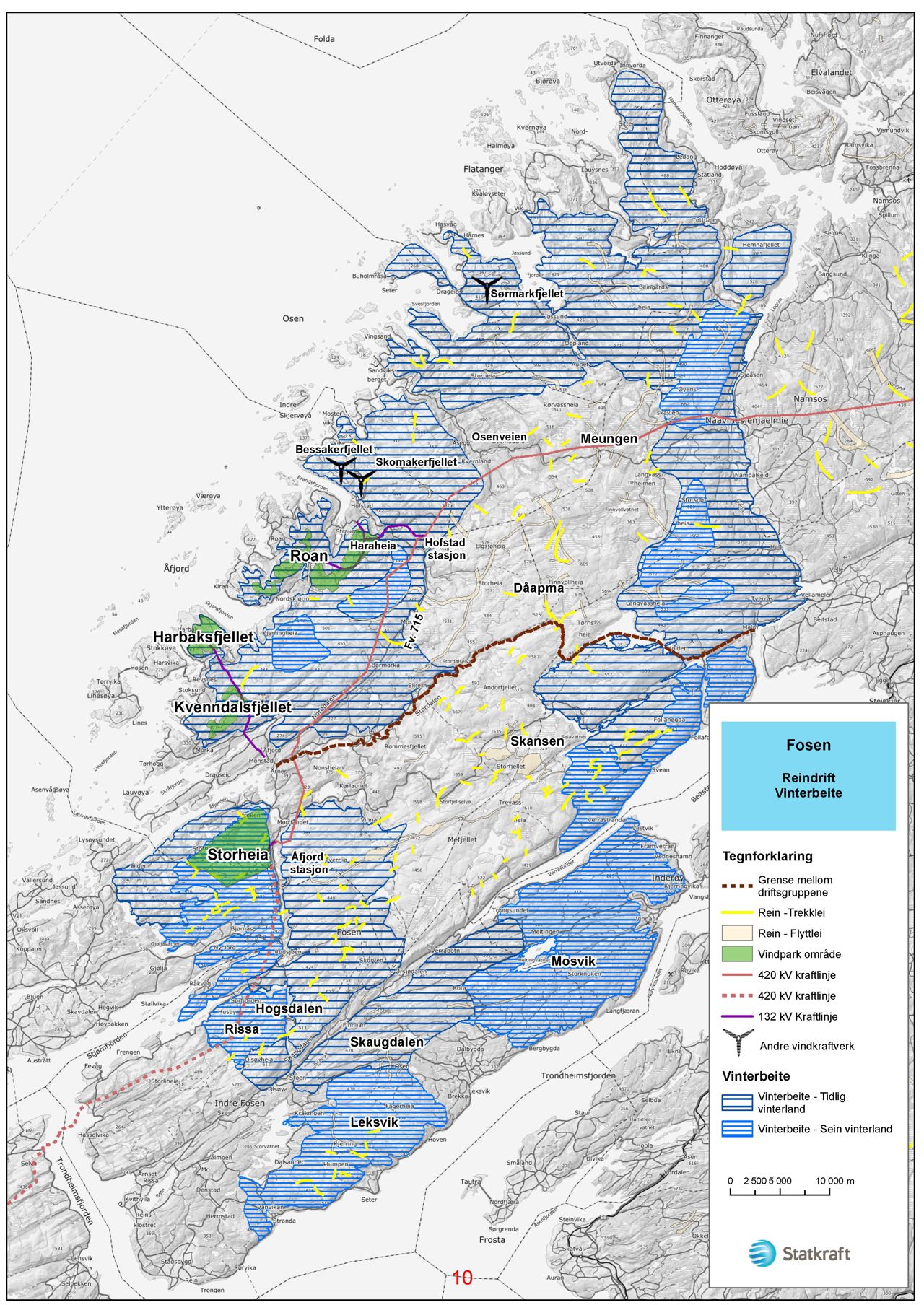
Reindeer herd at Storheia Wind Farm
The Fosen development and reindeer husbandry
The Fosen development consisted of six wind farms, two south of the Trondheim Fjord and four on Fosen, north of the fjord. Roan wind farm was sold in 2021 and today, Fosen Vind currently consists of five wind farms.
The first development proposal with plans for the Fosen Vind development was sent as early as 2002. Through a long and thorough process, the authorities at the Norwegian Water Resources and Energy Directorate (NVE) and the Ministry of Petroleum and Energy granted final licences for these parks in 2013, except for the Harbaksfjellet wind farm, which received its licence in 2004.
In total, there were applications for twenty projects totalling more than 4000 MW at Fosen and in Namdalen. Through the case processing and based on consideration of other interests, including reindeer husbandry, this was reduced to less than a quarter in an overall assessment. The reduction affected entire parks, but also the size and adaptation of the wind farms that finally received a licence.
Reindeer husbandry at Fosen
The reindeer herding at Fosen consists of two sites, Sør Fosen and Nord Fosen, which in turn are each divided into three smaller shares held by separate families. The reindeer grazing district has a reindeer count of up to 2100 animals and is divided into grazing areas for different seasons, which together constitute a gross area of 4339 km2. The seasonal pastures for the Fosen reindeer grazing district are not as separate as in many other reindeer grazing districts. The grazing areas constitute a significant part of the area on the Fosen peninsula.
Fosen Vind has three wind farms at Fosen: Storheia, Kvenndalsfjellet and Harbaksfjellet. All of these are located within the grazing area of the Fosen reindeer grazing district, Fovsen njaarke sijte. By comparison, the licensed area of these wind farms is about 60 km2. Of this, up to 3% are directly affected by roads and technical installations.

Mitigation measures and compensation, the construction period
Through the licensing process, Storheia wind farm was reduced in area to safeguard the interests of reindeer husbandry to a greater extent. The licence conditions list several mitigation measures to compensate for the strain the wind farms entail for reindeer herding. This was especially true during the construction period when the disadvantages were expected to be greatest. Amicable agreements were therefore entered into after dialogue with the reindeer herding group on compensation and mitigation measures for this period. This included funds for shepherd's housing, upgrading slaughter facilities, costs for additional supervision and herding, clearing of draughts, compensation for reduced grazing flexibility, as well as coverage of legal assistance and administrative costs. For the construction period, this amounted to approximately NOK 9 million for both reindeer herding groups.
Upgraded migration paths for the reindeer
Clearing relocation paths to the South Fosen Site’s alternative winter pastures was part of the mitigation measures that were implemented.
Storheia wind farm is located within one of the winter pastures used by the South Fosen site. The planning area accounts for approximately 20% of the winter pasture affected. One of the mitigation measures included in the concession and in the agreement with the operations group south was to clear existing relocation leases to two of the other important winter pastures in Rissa and Leksvik. These relocation paths were overgrown and were also affected by various barrier effects from agriculture and transport. After clearing the relocation paths, the reindeer can more easily be led to other winter pastures and thus increase the grazing flexibility of reindeer herding. One of these was used to drive parts of the reindeer herd to winter grazing in the winter of 2022.
According to the licence, Statkraft was obliged to finance 75% of the clearing of two of these relocation leases. Fosen Vind took responsibility for implementing the measure. Almost 12 km of relocation leases have been cleared and several inspections have been carried out together with the operations group, landowners and the County Governor to make adjustments so that the reindeer herd can easily be moved by snowmobile. Even though reindeer herding through the Reindeer Husbandry Act has the right to up-keep traditional relocation camps, Fosen Vind has, in order to avoid land-use conflicts, chosen to compensate landowners for lost forest and inconvenience as a result of the forest clearing.

Mitigation measures and compensation for the period of operation
A similar agreement to cover losses or additional costs during the operational period, as for the construction period was not achieved. The determination of conditions and compensation for the period of operation therefore went to the discretionary court for determination. In the same court proceedings, the validity of the licence was also considered. Both the determination of the compensation and the validity were appealed further and ended up pending in the Supreme Court.
In the autumn of 2021, the Supreme Court ruled that the discretion could not be promoted as the concession as it appears in the long term this would entail a violation of the rights of the Sami and the possibility of maintaining their industry and the exercise of their culture. Based on the judgment of the Supreme Court, the Ministry of Petroleum and Energy (MPE) has initiated a process to ensure an updated knowledge base as a basis for making a new administrative decision that stands up for posterity. This includes identifying adequate mitigation measures in dialogue with the reindeer herders and what changes to the licence are necessary to ensure the protection of reindeer husbandry under international law.
As part of the Ministry's work, Fosen Vind has submitted a proposal for a study programme aimed at studying possible mitigation measures that can safeguard the industry in the long term.
The Supreme Court did not decide what would happen to the listed wind farms. Fosen Vind's principle is to respect human rights in all its activities. It is therefore important for the company to help the MPE to make new decisions that in the long term safeguard the reindeer owners' livelihoods and cultural practices and their protection under international law, while maintaining the production of renewable power.
Kontakt
